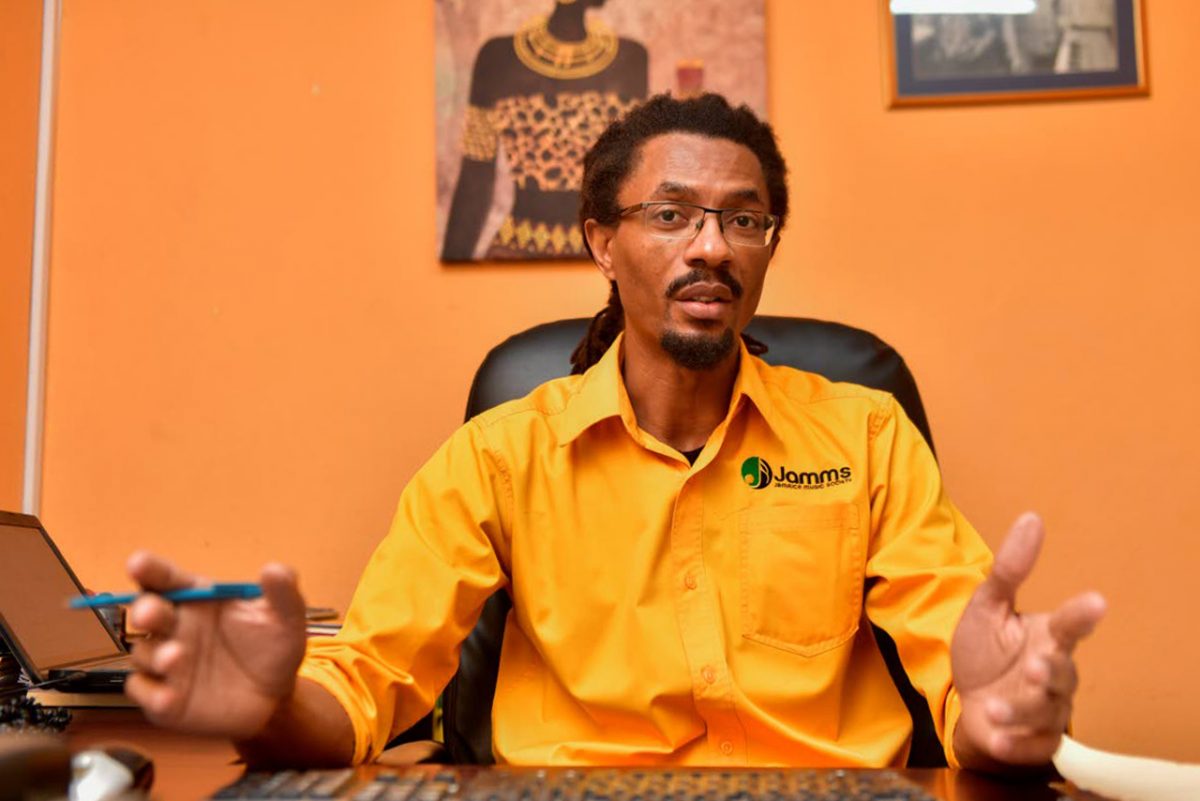Jamaica Music Society Paid Out $200 Million Dollars To Industry

Jamaica Music Society (JAMMS) has been in operation since 2007 and General Manager Evon Mullings is tasked with organizing a seamless machinery locally and internationally, to collect royalties on behalf of its members, while playing an active role in improving the perception of Jamaica’s music business.
In this interview, we talk about the immediate challenges in the music industry and how new artists and producers might expand their brands and earn more money.
Evon, how did you get to your current job?
I was into music production before I became the head of JAMMS, I was working a full time job as a trained economist. I was still dabbling into music production. I used to hang out at studios and get beats while working my regular job but then I decided at some stage I would go full speed into the music business. As faith would have it my wife saw this job in the papers and said ‘why don’t you apply for the job and mix the business with your pleasure?’.
What is JAMMS and what is your day-to-day job?
JAMMS is a music rights management company. We handle the rights of record producers, artists, and musicians. We handle the rights that they have in their music not just in Jamaica but on a global scale. We do a similar job to BMI, ASCAP and Sound Exchange except we handle the rights of record producers and performers. We have arrangements globally to ensure that right across the globe we are able to bring home royalties for our members.
What I do day to day is build the organization with a proper structure, make strategic decisions, planning, organizing, negotiating with broadcasters (and others) so they can have the rights they need to have to play the music and pay us the fee. And where there is infringement we take care of business.
Since you joined JAMMS the music business in Jamaica got more revenue?
Certainly. The first five years were tough because we are dealing with a market that is not used to paying for music. Our revenue base has grown really strongly, locally and overseas. We have been able to establish a base of continuous revenue flow which has even helped us to face this period. We lost a chunk from events but we have revenue coming from the broadcast side, radio, tv, etc. Every year except last year we had an increase of distribution to our members.
Since 2007, what is the biggest royalty check you have distributed to a member?
We have done almost J$2 million dollar checks.
How much have you paid out to the industry overall?
We are close to a J$200 million payout since 2009.
Is there a greater role that JAMMS could play to help advance Jamaica’s music industry?
I think we have a huge role to play to help how Jamaicans view and participate in the music business. There is some inertia and we haven’t learned as much as we should. We are researching and doing the development. We want to bring about a more business focus and we have seen some change where hundreds of people have decided to join and say they want us to do their business.
From your position, how do you think Jamaican artists and composers and sports stars can turn their cultural capital into financial capital?
A huge part of that is management. There is talent but what’s needed is astute management to chart a path for them to success. Having managers who know how to manage is a gap that needs to be filled with more trained and talented managers and artists seeing the need for the management and willing to pay for it. A lot of artists have strong potential but surround themselves with people who cannot get them very far. There is also the need for proper investment to make it happen.
Why do you think Reggae and dancehall sell so little?
Songs are not getting into the streams. The song is on the digital platform but that’s just putting a product in a shop. You have to ensure the product on the shelf is appealing and you need huge money to break songs. To truly have a successful song internationally it’s gonna need resources. Look at OMI, that song took a couple years before it broke but they never wavered; they ensured the machinery was there until it began to gain traction and cascade into a hit. We throw songs out with a high rate of release but they become disposable.
Who are your top five artists right now?
I listen to Jaz Elise, Lila Iké is at the top of my playlist, Jesse Royal, Protoje, and I have Garnet Silk and Dennis Brown. I also like Yaksta, Nation Boss.
Of that list, who do you think can go all the way to the top?
I do like Lila Iké. Her writing is good and I think she will make it big. Jesse Royal is there. We have been watching Intence, Skillibeng but they are hitting the mark locally but I don’t see them hitting overseas as yet.
There are some feel-good songs but I don’t see anyone who is a Shabba Ranks yet…maybe Shenseea is the closest to becoming the next international star.
What advice do you have for new artists?
Build your catalogue. Find a team of writers. Have a good team around you and once you reach a certain level get a manager. Be willing and open to allow for people to invest in your career, be open to partnerships. Make songs with shelf life somewhere in the world.
Evon, thank you so much.
Thanks JR
For the full interview listen to the World Music Views Podcast on Apple and Spotify.
